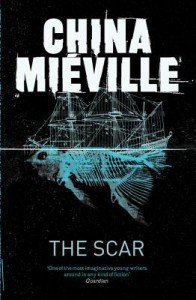The Scar - China Mieville

Happy 2015, everyone!
For my first finished read of the year, The Scar is...not too shabby. As an indication of the reading year to come, it's pretty darn good.
As Mieville's second Bas-Lag novel, it's formally a follow-up to Perdido Street Station, although it's not a sequel in any usual sense. Its protagonist, Bellis Coldwine, does flee the grim, repressive, industrial city of New Crobuzon (think Ankh-Morpork but real, as opposed to a place for jokes to happen) as a direct result of the events of the first novel; but reading The Scar does not really require any knowledge of Perdido Street Station.
The Scar is, firstly, a novel of the sea. Fleeing her home city on the Terpsichoria, a ship bound for the new colony of Nova Esperium, Bellis, along with the rest of the ship, is captured by pirates. But these are not just any pirates: they are agents of Armada, a floating city which lives by piracy and theft, off what is stolen on the high seas. And Armada has a daring plan involving tremendous magical forces.
The Scar is also, then, a novel about remaking and adaptation. Armada is a city in flux, forever being recreated by the new citizens, the new ships, that it takes into itself. Its rules and laws are mutable, negotiable; its customs change with every new arrival, and existing cultures and customs change within this melting pot as they come into contact with each other. The Remade of New Crobuzon, criminals and slaves in their home city, are greeted as worthy citizens. Characters, too, remake themselves: Tanner Sack becomes a fish-man, the better to swim in the waters that he loves; Shekel, former gang leader, learns to read; Silas Fennec becomes Simon Fench. Finally, the novel itself is a thing which constantly remakes itself: what you think is happening quickly comes to mean something else; perspective is deeply unreliable; plot and motivation is as unconstant as the sea which carries Armada.
It's a novel about stories. More specifically, it's a novel about how stories may tell us some of the truth, but never all of it. How they mislead and deceive and lie, how they are used to mislead and deceive and lie, time and time again, but still we listen to them. How stories use us; and how we allow them to. It's not a novel for those who need closure, this: ends are left loose, mysteries left unexplained. All we are given are possibilities. Paths the truth may take; or may not. We can choose to read this as negative - as misleading, as confusing, as irritatingly inconclusive - or as positive - as an expression of openness, of potentiality.
I love reading Mieville's novels, because they are that rare and fascinating thing, fantasy that thinks, that exploits exactly the possibilities of speculative fiction. If the races that populate his world occasionally veer into the ridiculous - we meet, after all, humanoid fish, humanoid crustaceans, humanoid mosquitoes, even - then that's almost beside the point. The Bas-Lag novels are not realism. They are not explorations of what is; they are explorations of potential, of possibility. They ask "what if?", not in order to find out something about the question, as hard SF tends to do, but in order to find out something about the questioner, which is what art does.
It's true that, plot-wise, The Scar is weaker than Perdido Street Station, which is why I've only given it 3.5 stars. It has little of the claustrophobic density of feeling of its predecessor, and the lack of answers we get is frustrating, on a narrative level, whatever its literary effect. On the other hand, I loved inhabiting the unique and vivid world of Armada, even if only for a little while. And those deceitful stories? Well, I wouldn't give them up for a big clock.


